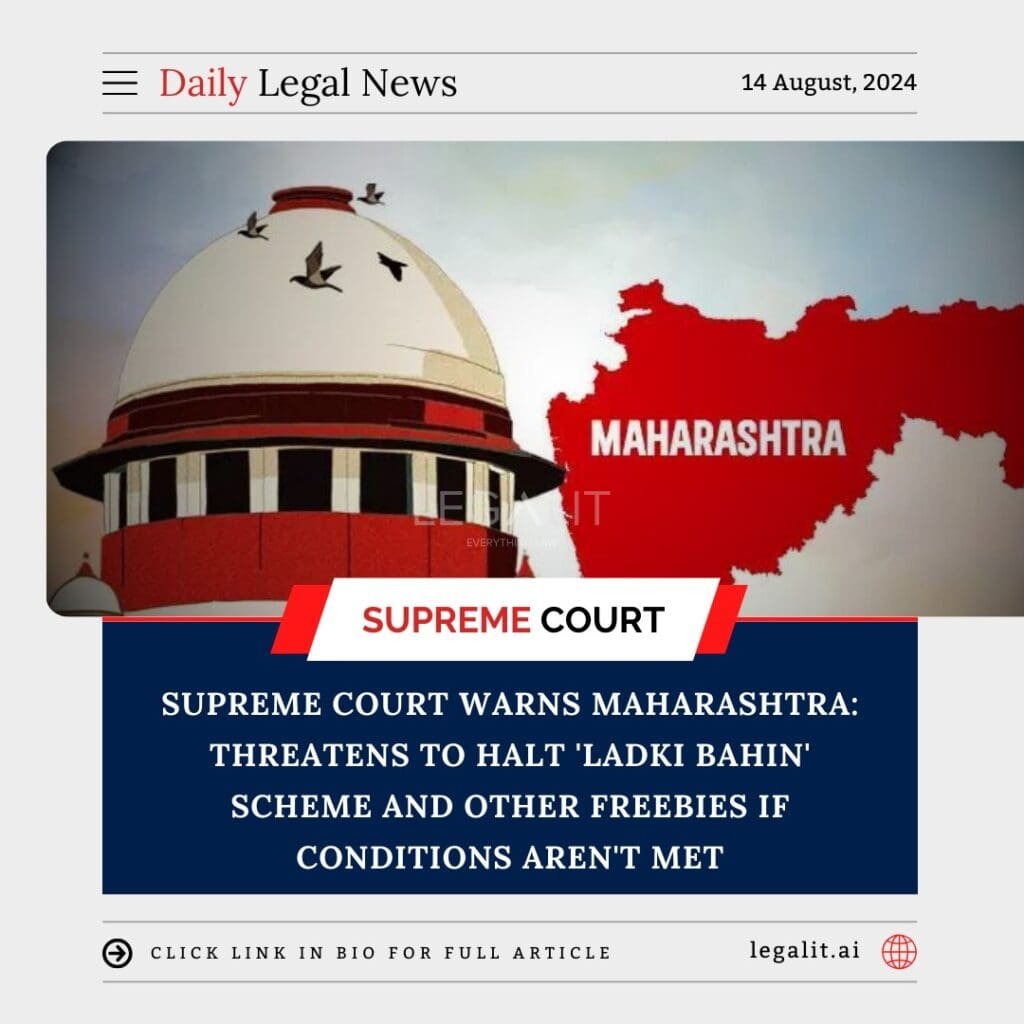
In a recent hearing, the Supreme Court of India issued a stern warning to the Maharashtra government, indicating that it could halt the ‘Ladki Bahin’ scheme and other similar initiatives if the state fails to meet certain conditions. This directive highlights the Court’s increasing scrutiny of government welfare schemes, particularly those perceived as “freebies,” and its concern over the fiscal responsibility and transparency of such programs.
Background of the ‘Ladki Bahin’ Scheme
The ‘Ladki Bahin’ scheme is a welfare initiative launched by the Maharashtra government aimed at providing financial support and benefits to girls and women in the state. The scheme is part of a broader effort to promote gender equality and empower women through targeted financial aid, educational support, and other benefits.
However, such welfare schemes have been subject to criticism and legal challenges, particularly regarding their sustainability, the financial burden they impose on state budgets, and the potential for them to be used as political tools rather than genuine welfare measures. The term “freebies” is often used in a pejorative sense to describe these types of initiatives, especially when they are perceived to be announced without adequate financial planning or long-term sustainability.
Supreme Court’s Directive
- Warning of Halting the Scheme: The Supreme Court warned the Maharashtra government that it could stop the ‘Ladki Bahin’ scheme and other similar welfare programs if certain conditions are not met. The Court’s intervention is likely based on concerns over the fiscal prudence of the scheme, its implementation, and whether it aligns with constitutional and legal standards.
- Conditions to Be Met: While the specific conditions set by the Court have not been fully detailed, they likely include requirements for transparent implementation, proper budgeting, and assurance that the scheme serves a genuine public interest rather than being a politically motivated initiative.
- Focus on Fiscal Responsibility: The Court’s warning underscores the importance of fiscal responsibility in government spending, especially for welfare schemes that have significant financial implications. The Court may be concerned about the potential for such schemes to strain state budgets or lead to mismanagement of public funds.
Implications of the Ruling
The Supreme Court’s warning has several critical implications for the Maharashtra government and its welfare policies:
- Increased Judicial Scrutiny of Welfare Schemes: The ruling signals that the judiciary is closely monitoring state welfare schemes, particularly those that involve substantial financial outlays. Governments may face increased legal challenges if their schemes are perceived to be financially irresponsible or poorly implemented.
- Potential Halt of Popular Schemes: If the Maharashtra government fails to meet the Court’s conditions, there is a real possibility that the ‘Ladki Bahin’ scheme and similar initiatives could be halted. This would have significant political and social implications, particularly for the beneficiaries who rely on these programs.
- Encouragement of Better Governance: The Court’s intervention may prompt the state government to improve the governance, transparency, and financial management of its welfare schemes. This could lead to more sustainable and effective programs that genuinely benefit the intended recipients.
- Impact on Political Strategies: The ruling could influence how political parties approach the announcement and implementation of welfare schemes. Parties may need to ensure that their promises are backed by solid financial planning and legal compliance to avoid judicial intervention.
Moving Forward
Following the Supreme Court’s warning, several actions are likely to be taken:
- State Government’s Response: The Maharashtra government will need to respond to the Court’s concerns by demonstrating that the ‘Ladki Bahin’ scheme and other similar programs are financially sustainable and legally compliant. This may involve presenting detailed budgets, implementation plans, and impact assessments.
- Review of Other Schemes: Other state governments may also review their welfare schemes in light of the Supreme Court’s stance, ensuring that they meet legal and financial standards to avoid similar challenges.
- Continued Legal Oversight: The judiciary may continue to play an active role in overseeing the implementation of state welfare schemes, particularly those that involve significant public spending or are perceived to be politically motivated.
- Public and Political Debate: The Court’s warning is likely to spark debate about the role of welfare schemes in Indian politics, the definition of “freebies,” and the balance between providing social support and ensuring fiscal responsibility.
Conclusion
The Supreme Court’s warning to the Maharashtra government regarding the potential halting of the ‘Ladki Bahin’ scheme and other similar welfare initiatives underscores the growing judicial scrutiny of government welfare programs, especially those with significant financial implications. As the Maharashtra government works to address the Court’s concerns, this case highlights the need for transparency, fiscal responsibility, and genuine public interest in the design and implementation of welfare schemes. The outcome of this case could have far-reaching effects on the future of welfare policies across India, setting important precedents for the balance between social support and financial prudence.